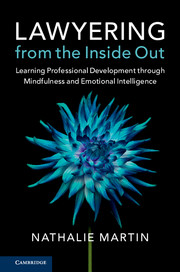 Lawyering from the Inside Out
Lawyering from the Inside Out Book contents
- Frontmatter
- Dedication
- Contents
- List of Figures
- List of Contributors
- Foreword
- Acknowledgments
- Introduction
- PART I NURTURING YOUR BEST SELF
- PART II YOU AND OTHERS AROUND YOU
- 9 Introduction to Emotional Intelligence: Theory and Practice
- 10 Advanced Emotional Intelligence Skills
- 11 Emotional Intelligence on the Page: The Writer's Life
- 12 Giving and Receiving Feedback
- 13 Empathy
- 14 Cross-Cultural Lawyering
- 15 Making Mindful, Client-Centered Decisions
- PART III YOU AND SOCIETY: FINDING GREATER PURPOSE
- Index
14 - Cross-Cultural Lawyering
from PART II - YOU AND OTHERS AROUND YOU
Published online by Cambridge University Press: 18 May 2018
- Frontmatter
- Dedication
- Contents
- List of Figures
- List of Contributors
- Foreword
- Acknowledgments
- Introduction
- PART I NURTURING YOUR BEST SELF
- PART II YOU AND OTHERS AROUND YOU
- 9 Introduction to Emotional Intelligence: Theory and Practice
- 10 Advanced Emotional Intelligence Skills
- 11 Emotional Intelligence on the Page: The Writer's Life
- 12 Giving and Receiving Feedback
- 13 Empathy
- 14 Cross-Cultural Lawyering
- 15 Making Mindful, Client-Centered Decisions
- PART III YOU AND SOCIETY: FINDING GREATER PURPOSE
- Index
Summary
The real voyage of discovery consists not in seeking new landscapes, but in having new eyes. Paraphrased from Marcel Proust, Remembrance of Things Past: The Captive, Volume III
As a member of the legal profession, you will engage with others of diverse cultural backgrounds – clients, other lawyers, judges, and jurors. To be an effective lawyer, you “must be able to recognize, and appropriately respond to, [your] own and others’ cultural perceptions and beliefs because these often play a central role in lawyerclient communications.” Therefore, it is important to become aware of how your cultural background affects your “perceptions, beliefs, and actions” so as to avoid “cultural misunderstandings [that] may impede lawyers’ abilities to effectively interview, investigate, counsel, negotiate, litigate, and resolve conflicts.” You will need not only to recognize the “cultural lens” through which you see others, but also employ methods to facilitate your ability to “see the world through the eyes of others.”
CULTURAL SELF-AWARENESS
Let us begin with a word about nomenclature. While many legal scholars use the term “cultural competence” to describe the ability to engage in effective crosscultural lawyering, I will use the term “cultural self-awareness” for two reasons. First, some legal scholars have objected to the term “cultural competence” because “it is impossible for anyone to become competent in another's culture.” Second, effectively managing cross-cultural interactions begins with self-awareness. You will need to develop an awareness of your own cultural identity and implicit biases in order to determine how your cultural lens impacts the way you see and interact with others.
Little Pause: What do you believe are your strengths and weaknesses in dealing with cultural differences (when a person is of a different race, ethnicity, religion, generation, etc. from your own)?
The Impact of Culture
Culture can be based on “ethnicity, race, gender, nationality, age, economic status, social status, language, sexual orientation, physical characteristics, marital status, role in family, birth order, immigration status, religion, accent, skin color or a variety of other characteristics.” Because culture is so broad and diverse, a person can ascribe to more than one cultural group, each of which has a set of attitudes, values, and norms of behavior.
- Type
- Chapter
- Information
- Lawyering from the Inside OutLearning Professional Development through Mindfulness and Emotional Intelligence, pp. 208 - 214Publisher: Cambridge University PressPrint publication year: 2018


